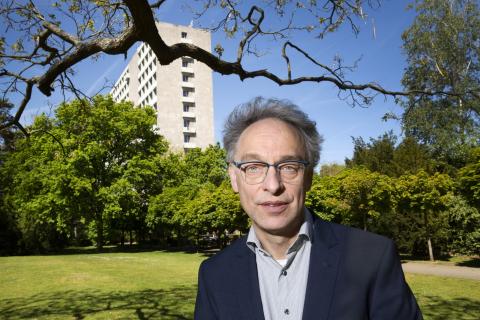Digital Sciences for Society kicks off with Call for proposals
In Tilburg University’s new strategy, the focus is on the digital sciences. The objective is to strengthen research and education in this field. In practical terms, this means open calls for research project proposals.
Digital sciences may not be the first strategic theme that springs to mind in the context of Tilburg University’s fields of expertise, but that is exactly what it is: digital technology is an indispensable tool in addressing existing social issues. Besides, the digital sciences are attractive to students, given the great demand for knowledge of this field in the job market. Therefore in its strategy, Tilburg University is fully committed to digital sciences for society. Dean Boudewijn Haverkort of the Tilburg School for Humanities & Digital Sciences is the academic lead. His energetic approach is already bearing fruit. Haverkort: “At the beginning of 2022, we drafted a vision for a program oriented on research, impact, and education. Before the summer holidays, we received the go-ahead from the university’s decision-making bodies. We set to work immediately.”
The program’s motto is ‘Digital sciences for society’. The underlying thought is that Tilburg University’s strengths lie in issues of applying technology in society
Open calls
The field of research & impact, the program is already past the preparatory phase. The university is now nudging its own scholars to submit proposals for Icon and Growth projects. There are open calls on the ‘Digital sciences for society’ program website, aimed at researchers who want to apply digital sciences to a social theme. Proposals for Icon projects need to be partnerships of researchers of at least three Schools. Moreover researchers are expected to collaborate with a civil society organization. Haverkort: “The latter does not need to be a very intensive collaboration. An organization providing inspiration as input also qualifies.” Two to three proposals for Icon projects are expected to be approved before the summer of 2023. That number will be increased to a total of five over the next two years. Considerable investments will be made in these Icon projects: approximately between € 500,000 and 1 million. These amounts consist of contributions by the university (strategy funding), the Schools, and the collaborating organizations.
Seeds
To create opportunities for small-scale initiatives as well, the program also offers funding for Growth projects, Haverkort explains. These are annual calls for which consortiums with researchers from at least two Schools can submit applications. Haverkort: “For instance, a study employing blockchain technology and exploring economic and legal aspects. This is very interesting for young scientists who want to get their hand in. I can also imagine that such seeds can later grow into something bigger.”
Photograph by: Ton Toemen

The funding of the Growth projects is inspired by the way in which start-ups raise money. This also goes for the selection of the proposals. It deviates from what is now commonplace in academia. The proposals will only be assessed on the basis of formal requirements. There will be a brief check, followed by a draw. According to Haverkort, that means less red tape: “This approach reduces the review pressure. We do not need to rank projects and we can give the go-ahead more quickly. Whoever is not successful in this draw can try again next year.” By the middle of 2023, it will be clear what Icon and Growth projects have been selected. They will be highlighted during an event on the digital sciences.
Invitation to contribute ideas
The research calls are the most visible components of the program. There are many activities taking place behind the scenes, including an initiative to explore what opportunities are still out there. Tilburg University has been committed to data science and artificial intelligence for quite a while now. But there is enough uncharted ground to explore. A working group is mapping it as we speak. According to Haverkort, the relevant fields include software engineering, cyber security, e-marketing, and cloud computing. “We want to know in what areas we can further strengthen our education and research.”
The digital sciences are a relatively new field. If you are not active in it yourself, you run the risk of missing out on certain things
Activities to strengthen education are also taking place in the background. The results of an ‘invitation to contribute ideas’ will soon become clear, Haverkort says. “This involves identifying the things that the Schools are doing in the field of digital sciences, but also what else they would want to undertake. “The digital sciences are a relatively new field. If you are not active in it yourself, you run the risk of missing out on certain things. We want to close potential digital gaps by talking to the Vice-Deans for Education.”
Haverkort thinks it is important to involve all Schools and relevant supporting organizational units in the program. In his view, Library & IT Services could play a significant role. “They teach courses and may be able to offer even more support in project applications if digital infrastructures are called for.” In Haverkort’s opinion, the digital sciences are an integral theme. “You can see it as a new kind of language that everyone needs to become more and more competent in.”
'Weaving Minds & Characters' Strategy Towards 2027
Stay up-to-date on all strategic developments and activities leading up to our 100th anniversary.
